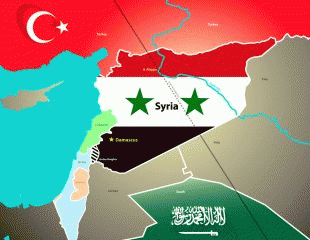Reprinted from Counterpunch
It all started in 2009, when Qatar proposed to Damascus the construction of a pipeline from its own North Field -- contiguous with the South Pars field, which belongs to Iran -- traversing Saudi Arabia, Jordan and Syria all the way to Turkey, to supply the EU.
Damascus, instead, chose in 2010 to privilege a competing project, the $10 billion Iran-Iraq-Syria, also know as Islamic pipeline . The deal was formally announced in July 2011, when the Syrian tragedy was already in motion. In 2012, a Memorandum of Understanding (MoU) was signed with Iran.
Until then, Syria was dismissed, geo-strategically, as not having as much oil and gas compared to the GCC petrodollar club. But insiders already knew about its importance as a regional energy corridor. Later on, this was enhanced with the discovery of serious offshore oil and gas potential.
Iran for its part is an established oil and gas powerhouse. Persistent rumblings in Brussels -- still unable to come up with a unified European energy policy after over 10 years -- did account for barely contained excitement over the Islamic pipeline; that would be the ideal strategy to diversify from Gazprom. But Iran was under US and EU nuclear-related sanctions.
That ended up turning into a key strategic reason, at least for the Europeans, for a diplomatic solution to the Iranian nuclear dossier; a rehabilitated (to the West) Iran is able to become a key source of energy to the EU.
Yet, from the point of view of Washington, a geostrategic problem lingered: how to break the Tehran-Damascus alliance. And ultimately, how to break the Tehran-Moscow alliance.
The Assad must go obsession in Washington is a multi-headed hydra. It includes breaking a Russia-Iran-Iraq-Syria alliance (now very much in effect as the 4+1 alliance, including Hezbollah, actively fighting all strands of Salafi Jihadism in Syria). But it also includes isolating energy coordination among them, to the benefit of the Gulf petrodollar clients/vassals linked to US energy giants.
Thus Washington's strategy so far of injecting the proverbial Empire of Chaos logic into Syria; feeding the flames of internal chaos, a pre-planned op by the CIA, Saudi Arabia and Qatar, with the endgame being regime change in Damascus.
An Iran-Iraq-Syria pipeline is unacceptable in the Beltway not only because US vassals lose, but most of all because in currency war terms it would bypass the petrodollar. Iranian gas from South Pars would be traded in an alternative basket of currencies.
Compound it with the warped notion, widely held in the Beltway, that this pipeline would mean Russia further controlling the gas flow from Iran, the Caspian Sea and Central Asia. Nonsense. Gazprom already said it would be interested in some aspects of the deal, but this is essentially an Iranian project. In fact, this pipeline would represent an alternative to Gazprom.
Still, the Obama administration's position was always to support the Qatar pipeline as a way to balance Iran and at the same time diversify Europe's gas supplies away from Russia. So both Iran and Russia were configured as the enemy.
Turkey at crossroads
Qatar's project, led by Qatar Petroleum, predictably managed to seduce assorted Europeans, taking account of vast US pressure and Qatar's powerful lobbies in major European capitals. The pipeline would ply some of the route of a notorious Pipelineistan opera, the now defunct Nabucco, a project formerly headquartered in Vienna.
So implicitly, from the beginning, the EU was actually supporting the push towards regime change in Damascus -- which so far may have cost Saudi Arabia and Qatar at least $4 billion (and counting). It was a scheme very similar to the 1980s Afghan jihad; Arabs financing/weaponizing a multinational bunch of jihadis/mercenaries, helped by a strategic go-between (Pakistan in the case of Afghanistan, Turkey in the case of Syria), but now directly fighting a secular Arab republic.
(Note: You can view every article as one long page if you sign up as an Advocate Member, or higher).






